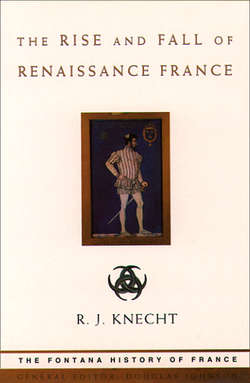Читать книгу The Rise and Fall of Renaissance France - R. Knecht J. - Страница 40
War with the emperor (1521)
ОглавлениеCharles of Habsburg was crowned King of the Romans at Aachen on 23 October 1520. Two days later Pope Leo X allowed him to use the title of ‘Roman emperor elect’. Charles hoped to go to Italy soon for his imperial coronation, but various matters detained him in Germany, among them the Lutheran Reformation. Francis hoped to return to Italy himself, but was prevented by a serious accident. However, he added to Charles’s problems in order to keep him out of Italy. Among visitors to the king’s bedside were Robert de La Marck, seigneur de Sedan, and Henri d’Albret, king of Navarre. Soon afterwards they invaded Luxemburg and Navarre respectively. Francis disclaimed any responsibility for their actions, but Charles was not deceived. He accused the king of waging war covertly and warned him of the risks involved. Soon afterwards an imperial army led by the count of Nassau threw La Marck out of Luxemburg, overran Sedan and threatened France’s northern border. In the south, Marshal Lescun’s army was routed at Ezquiros, and Spanish Navarre, which he had invaded, reverted to Castilian rule.
In Italy, too, Francis ran into serious trouble. On 29 May, Leo X came to terms with Charles V. The latter promised to restore Parma and Piacenza to the Holy See, to assist the pope against the duke of Ferrara and to take the Medici under his protection, while Leo promised to crown Charles emperor in Rome and signified his willingness to invest him with Naples. The treaty, however, was kept secret until Leo was given a pretext to break his alliance with France. In June, Lescun, who had been left in charge of Milan, invaded the States of the Church in pursuit of some rebels. His action gave the pope the pretext he had been waiting for. When an ammunition dump in Milan exploded, killing many French soldiers, Leo acclaimed the event as an act of God and made public his treaty with Charles. Soon afterwards they formed a league for the defence of Italy. Denouncing the pope’s ingratitude on 13 July, Francis banned the export of all ecclesiastical revenues to Rome and imposed heavy fines on Florentine merchants in France. He boasted that before long he would enter Rome and impose laws on the pope.
By the summer of 1521, Francis had cause to rethink his policies. The emperor was threatening his northern border, Navarre was again under Castilian rule, the pope had turned imperialist and the French hold on Milan was precarious. On 9 June the king accepted an offer of mediation from Henry VIII, and in July an international conference met at Calais under Wolsey’s chairmanship. Francis wanted peace, not a truce, but Mercurino di Gattinara, the imperial chancellor, wanted neither. He was anxious to prove that Francis had been the aggressor as the first step towards forming an Anglo-imperial alliance.
On 20 August the emperor invaded northern France. For three weeks Mézières was heavily bombarded, but the garrison, commanded by Bayard, put up a stout resistance. This gave Francis time to gather an army near Reims. He still hoped for peace, but the Calais conference was getting nowhere. Wolsey, who had paid a mysterious visit to the emperor in Bruges, seemed to be playing for time. In late September the title of war suddenly turned in France’s favour. On 26 September, Nassau lifted the siege of Mézières and retreated into Hainault; in Italy, Lautrec relieved Parma; and on 19 October, Bonnivet captured Fuenterrabía on the Franco-Spanish border. These French victories naturally affected the talks in Calais. When Wolsey suggested a truce, Francis was no longer interested. He planned to relieve Tournai which was being besieged by the imperialists, but on 23 October he missed a unique opportunity of defeating the enemy, and on 1 November he began retreating towards Arras. Nine days later he disbanded his army; soon afterwards Tournai capitulated. Francis was hoping for better news from Italy, but on 19 November the league’s army captured Milan. The French were then driven out of other towns in the duchy. The Calais conference, meanwhile, came to an end. On 24 November, in the Treaty of Bruges, Wolsey committed England to enter the war on the emperor’s side in 1522.
